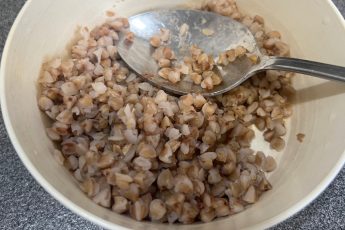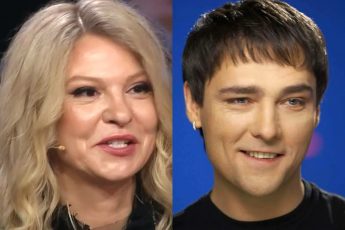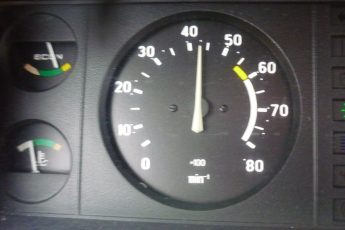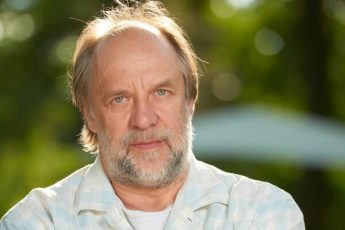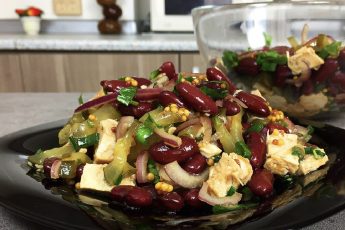«Good day, Annusya! How are you today?» Midwife Zinaida Petrovna, a plump woman with kind eyes, adjusted the snow-white cap on the newborn’s head. **»What a handsome boy, just like his father.»
«He’s beautiful,» Anna whispered, holding the bundle with her son close to her chest. **»My husband was supposed to come for us today. He said he’d be here by noon.»
Outside the maternity ward, snow was falling—large, fluffy flakes, but somehow sad. The gray sky over the frozen village seemed very low, as if pressing down on the rooftops. That February was particularly cold and hungry, like the entire strange winter after the country’s collapse.
Anna gently touched her son’s tiny nose with her finger, gazing in wonder at this little being that had been part of her body just a week ago. And now he was separate—Pavlik, Pavlusha, her firstborn.
«They say the blizzard will pick up by evening,» Zinaida Petrovna continued, filling out some papers. «Is your husband coming by car?»
«By sleigh,» Anna smiled. «In Olkhivka, almost no one has cars, and Vanya works at the sawmill. They have a workhorse there. He managed to borrow it for today.»
«Romantic,» the midwife sighed. «Just like in the old days. Well, get ready, dear, we’re discharging you. Wait for your husband in the hall.»
Anna carefully wrapped her son in the hospital blanket with a blue border—the only «dowry» provided in the maternity ward. She covered him with her down shawl—the same one her grandmother used to wear. She had nothing else warm, and it was freezing outside.
Time passed, but Ivan didn’t arrive. Anna sat on the worn-out couch in the vestibule, staring out the snow-covered window. Nurses passed by, casting sympathetic glances at her. The clock showed three, then four.
«Maybe he’s delayed?» a young nurse timidly suggested as the hands approached five.
Anna nodded, but anxiety had already settled inside her. Ivan was never late. Never. Especially not when it came to something important. And what could be more important than picking up his wife and newborn son from the maternity ward?
At six, a man entered, shaking snow from his hat. Anna leaned forward hopefully but immediately slumped— it wasn’t Ivan. It was their neighbor, Mykhailo Stepanovych, an older man with graying mustaches. Seeing Anna, he stopped, and something flashed in his eyes that made the woman’s heart sink.
«Anya,» he said quietly, approaching. In his hands, he held Ivan’s worn cap.
«What happened?» she whispered, though she already knew the answer.
«I’m sorry, Anya,» Mykhailo Stepanovych lowered his head. «He didn’t make it. At the turn before the bridge… the horse got spooked, bolted… the sleigh overturned, and there—a ravine and ice…»
Anna stared at him, unblinking. The words reached her as if through water—blurred, indistinct.
«Vanya?» she mouthed.
**»He fell through the ice. They pulled him out, but… it was too late.»

The baby stirred in the blanket, and Anna instinctively held him closer. Somewhere at the edge of consciousness, a thought flickered— that’s it, her Vanechka is gone. No more. And there won’t be. But she couldn’t believe it. Not now, not at this moment, not when her tiny son was in her arms.
«Can you walk?» Mykhailo Stepanovych asked softly, supporting her by the elbow. «I brought the sleigh; I’ll take you home.»
Anna nodded slightly and stood up; her legs felt unresponsive, like cotton. She moved as if in a daze; everything around her was blurred, unreal. A nurse slipped something into her coat pocket—some documents, said something, but the words didn’t register.
All the way to the village, Anna silently stared at the snow-covered fields. The wind whipped up snowdrifts, and the horse slowly made its way through the blizzard. It seemed time had stopped, and only one thought wouldn’t leave her: «Why today? Why when happiness was so close?»
The village greeted them with silence. Only the barking of dogs and lights in the windows reminded that life went on, despite everything. Mykhailo Stepanovych stopped right by their house—old, leaning, but dear.
«It hasn’t been heated since morning,» the man muttered apologetically. «I’ll fix everything now, light the stove, wait.»
Anna stood in the middle of the room, holding her son to her chest, and looked at the empty bed. That morning, Ivan’s things were still there—the shirt he wore for the trip to the district center, the razor on the windowsill, an unfinished cup of tea. Everything still smelled of him. His presence. A life that suddenly ended.
Pavlik cried—quietly, plaintively, as if sensing his mother’s grief. Anna automatically unbuttoned her coat, sat down, and brought the child to her breast. Only when he began to suckle did tears roll down her cheeks—hot, silent, unstoppable.
«Mom, what was Dad like?» Pavlik sat on the porch, swinging his legs. He was already eight, fair-haired, with serious eyes.
Anna looked up from the laundry, straightened her back. Her hands, whitened from the cold water, were numb, but the work had to be finished before dark.
«He was good,» she smiled. «Kind. Strong. When he laughed—the whole neighborhood heard. And how he worked! He was the best at the sawmill.»
«Did he love me?» the boy glanced at the cracked porch board.
«Oh, how he loved you,» Anna sat beside him, hugging her son with wet hands. «He waited for you so much. He chose your name himself. Said: ‘We’ll name him Pavlo. Pavlo means rock. He’ll grow up strong.'»
The boy sighed, pressed against his mother. Anna knew what he was thinking. In the village, all children had fathers; only he was without one. It was hard, especially for a boy.
«You need to fix that gate,» Anna said, looking at the leaning gate.
«I’ll learn myself,» Pavlik said firmly. «Like Dad.»
He jumped down from the porch and ran to the shed for tools. Anna watched him go, her heart aching. Her son was growing up too fast. Far too fast.
Life in the village had never been easy, and it was especially hard for a woman raising a child alone. Anna worked from morning until night — at the collective farm during the day and tending to the household in the evening. The cow, the garden, the chickens — everything needed hands and strength.
Then came the hard times. The collective farm collapsed, salaries stopped coming. People survived however they could — from their gardens, by doing odd jobs. Many left. But Anna stayed. Where would she go with a little boy?
They survived thanks to her persistence. Milk from the cow, eggs, potatoes. In summer — mushrooms and berries from the forest, which she could sell. Pavlik grew up as her helper. By seven, he was milking the cow; by eight, he was chopping firewood. Thin but quick, serious beyond his years.
«Mama, I’ll never leave you,» he once said as they sat by the stove.
«Why do you say that?» she asked, surprised.
«Petko Kuznetsov says his brother grew up and moved to the city, left his mother all alone.»
«Well, that brother has both a mom and a dad,» she said, stroking his head. «But you only have me.»
«And you only have me,» Pavlik nodded.
She never forgot those words. There was so much adult awareness in them, it made her heart ache. Her son barely had a childhood. At eight, he was already thinking about winter, counting firewood, checking if there were enough potatoes. His shoulders would straighten whenever someone came near — as if to say, I can handle it.
When Pavlik sat down to his schoolbooks, it was with the seriousness of an adult tackling important work — frowning, focused. Math came especially easy to him. «Look at how he calculates,» whispered neighbor Klavdiya. «What a bright mind!» The teacher advised sending him to a special school in the city.
«Where would I send him?» Anna sighed. «And how would we live there? Who would stay here with me?»
At fifteen, Pavlo first spoke about getting a job. The collective farm was gone; a private farm had taken its place. Men went there to work seasonally.
«I’ll be a tractor driver,» he said when his mother protested. «They pay well. Later, I’ll get my own equipment.»
«You need to study,» she argued. «People praise you.»
But Pavlo was stubborn. At sixteen, he worked as an assistant; at seventeen, he was driving the tractor himself. The money started coming in — not much, but steady. Anna was proud, though her heart was anxious — was he taking on too much too soon?
«Mama, I’m going to the city,» he said one day, wiping down a carburetor. He had become a real man — tall, broad-shouldered, with serious eyes.
Anna froze with clothespins in her hands. She had feared this moment for years but knew it would come.
«Forever?» she asked quietly.
«No, of course not,» he smiled. «I’ll work at the sawmill. The same one where Dad worked. As a foreman. They provide housing. And I’ll visit you every Saturday. It’s only thirty kilometers.»
She nodded, hiding her tears. He was grown. It was time for him to make his life. But how hard it was to think that his footsteps would no longer echo in the house…
«Mama, I’m not leaving you,» he said, hugging her. «I just need to make some changes. I’ll earn more — it’ll be easier for you.»
«Go, son,» she said, stroking his back. «Go. I’ll manage.»
In September, he left. Took his things in his father’s old backpack, kissed his mother, and promised to visit in a week. And he kept his word. Every Saturday, his motorcycle buzzed into the yard. He brought gifts — tea, candies, fabric. Anna pretended she needed those things, but really she just rejoiced in seeing him.
The village grew quiet. The neighbors sympathized: «She’s all alone now…» But Anna didn’t feel alone. Every evening she spoke with Ivan, telling him how their boy had grown, what a good man he’d become.
«See, Vanya,» she whispered into the dark, «naming him Pavlo wasn’t in vain. Rock. Solid.»
It felt like Ivan was somewhere nearby, listening. And it made things easier.
Then Pavlo fell in love. He brought Lena—a delicate, dark-haired, serious girl.
“This is Lena. We work together at the sawmill. She’s an accountant.”
Anna saw in her eyes what she once saw in her own—quiet and light. They had a modest wedding. The young couple lived separately but visited on weekends.
Anna liked Lena—hardworking, modest. Her son was lucky.
When Lena became pregnant, Pavlo talked about bringing his mother to live with them.
“You’ll be with your grandson. While we’re at work.”
“I’ve lived here all my life. This is home. This is where Ivan is. I won’t leave,” Anna refused.
The grandson was born in May, when the apple trees were in bloom. Fair-haired, like a copy of Pavlo. They named him Ivan—in honor of his grandfather.
“Look, Vanyusha,” Anna whispered, “this is your grandson. Just like you. He carries your name.”
Every summer, Lena brought the little one to the village. Anna taught him everything—from gardening to fairy tales. And every day, she told him about the grandfather he never met but felt as if he were nearby.
“Grandma, was Grandpa really the strongest?” the boy would ask, settling on her lap.
“The strongest,” Anna affirmed with a slight nod. “I remember once at the sawmill, a log slipped and pinned a man. No one present could lift it. But your grandfather came over, strained all his muscles, and managed to lift it—he saved that poor man.”
The boy’s eyes sparkled with admiration. He asked his grandmother to retell the story again and again, then ran outside, trying to lift logs, sincerely believing that his grandfather’s strength had been passed down to him.
Life in the village moved slowly, steadily. People aged, houses decayed. Many yards were overgrown with weeds—the owners had moved to the city or passed away, and the village life held no appeal for their children. Anna increasingly caught the neighbors’ glances, as if wondering why she was still there, why she hadn’t moved to her son’s place. But she only sighed and shook her head.
When Vanyusha turned seven, he got a little sister—tiny Hannusia, named after her grandmother. Pavlo increasingly talked to his mother about moving:
“You’re nearly seventy, Mom. It’s hard for you alone,” he tried to persuade her. “And the grandchildren are growing up without their grandmother.”
“But they’re with me all summer,” Anna waved him off. “In the city, I’d wither. Here, the air is fresh, I have my garden. And Ivan is here…”
Pavlo understood that arguing was pointless. His mother always had a strong character, and with age, her stubbornness only grew. He helped as much as he could—brought groceries, medicine, repaired the roof, chopped wood.
She didn’t want to burden her son. She saw how hard city life was for him—constant work, worries. Sometimes, left alone, she would take a yellowed photograph of Ivan and softly say:
“See, Vanya, what a son we’ve raised. He carries everything on his shoulders, just like you did. He doesn’t complain, holds on bravely.”
Over the years, her memory began to play strange tricks on her. Sometimes she thought Ivan hadn’t died but had just gone to work and would return soon. On such evenings, she seemed to be caught in a whirl of the past. Her hands would automatically take a second plate from the cupboard, set another spoon, take two potatoes from the oven instead of one. Anna would sit on the bench, listening for the creak of the gate—any moment now, Vanya would come in, take off his hat, shake the snow from his felt boots… Only when she saw her reflection in the dark window—wrinkled, with graying temples—did she remember that all this was long in the past.
That February was fierce—with blizzards, snowdrifts, short days. One such gloomy evening, Anna was returning from the hayloft with an armful of firewood, hurrying and slipped on the icy porch. She fell, twisting her leg. A sharp pain pierced her thigh so intensely that her vision darkened. She crawled home on her knees, leaving the firewood behind. A neighbor who came to check on her found her in the hallway and called an ambulance. Thus, Anna found herself in the hospital for the first time in many years.
Pavlo rushed over immediately. He sat by her bed, held her hand, talked to the doctors. When it came time for discharge, he gave her no choice:
“Mom, you’re not going back to the village. Either come with us or go to a nursing home.”
Anna resisted for a long time, but her body betrayed her. Her leg healed poorly; even with a cane, walking was difficult. In her house with stove heating, high thresholds, and narrow passages, she felt helpless.
“All right,” she finally agreed. “But not for long, just until I get stronger. Then we’ll see.”
Though in her heart, she already knew: there would be no way back. The city awaited her—children, grandchildren.
Pavlo’s apartment was small but bright. Anna gradually got used to the new routine. A three-room dwelling with a gas stove and hot water from the tap seemed like a luxury to her.
Just yesterday, her world was limited to a village house, and now—the hustle of the city, a different rhythm of life. Lena, her daughter-in-law, welcomed her warmly, gave her a separate room—the one that once belonged to Vanya.
The first weeks were hard. Constant noise outside the window, car horns, the frantic pace of life around—it all seemed alien. At night, Anna couldn’t sleep for a long time, listening to unfamiliar sounds and missing the silence of her native village.
Her leg gradually healed. With a thin cane, she already felt confident at home: helped Lena, played with her grandchildren. And the grandchildren adored her. Her stories about the village, about Grandpa Ivan, became real fairy tales that conveyed family memory.
Every evening, Anna took her husband’s old cap from under her pillow—the only thing she kept from her former life. She pressed it to her cheek, inhaling the familiar, though barely perceptible, scent. And then she seemed to talk to Ivan again, as she had all her life: quietly, sincerely, in her own way.
“You know, Vanya,” she whispered, “our grandson is so much like you. Just as stubborn and strong. He carries your name. It’s like you’ve returned.”
In the city park near Pavlo’s house, the lilac alley was in bloom. Its delicate aroma filled the air. Anna sat on a bench, watching her grandchildren play on the playground.
Vanya was already sixteen—tall, broad-shouldered, with a mature look and an appearance that remarkably resembled the grandfather he had never seen. And nine-year-old Hannusya—a cheerful girl with braids and ribbons—joyfully swung on the swing.
“Grandma, look what I can do!” the girl shouted, soaring high above the ground.
“I see, dear,” Anna smiled gently. “Just don’t go too high—you might fall.”
Vanya approached his grandmother, sat down next to her.
“Tell me more about Grandpa,” he quietly asked. “About how he worked at the sawmill.”
Anna sighed, adjusted her headscarf. Though she was already many years old, the memory of Ivan remained vivid, as if it all happened yesterday.
“He was the best worker,” she began with a smile. “They made him a foreman before he was thirty. People respected him, listened to him. And he was fair, never humiliated anyone, worked alongside everyone.”
She spoke, and before her eyes appeared young Ivan—in a work jacket, with a smile, with strong hands that could lift a log and pick a wildflower for her. So many years had passed, and she remembered every detail, as if they had just said goodbye yesterday.
“How did you meet?” Vanya asked, though he had heard this story more than once.
“At a dance in the club,” Anna’s eyes lit up. “I had just finished school, and he was already back from the army. He came up, asked me to dance, and my heart fluttered—that’s him, my one. And so it was.”
The boy lowered his head. These stories were more precious to him than any books—because in them lived the man whose blood ran in his veins.
“I wish I could have seen him,” he whispered.
“And he sees you,” his grandmother replied confidently. “He watches from the sky every day and is proud of the man you’ve become.”
Returning home, they walked slowly. Anna held her grandson’s hand, and little Annushka ran ahead, holding a bouquet of dandelions.
The apartment smelled of pies—Lena was preparing for her mother-in-law’s return. Pavlo sat in an armchair, reading a newspaper. Seeing his mother, he stood up and helped her sit on the couch.
“How was the walk?” he asked, placing a pillow behind her back.
“Lovely,” Anna nodded. “The day is clear. In the village, the lilacs are blooming now, white and fragrant. And the apple trees too. Do you remember the old apple tree by the fence? I wonder if it’s still standing.”
“It’s gone, Mom,” Pavlo said gently. “Last year, when I went to collect things, I saw—it had fallen. It was old.”
Anna sighed. That apple tree had been there since their wedding day. Ivan had planted it. It was a symbol of their love. It stood for so many years and couldn’t hold on.
“Everything passes,” Anna said thoughtfully. “Everything has its time.”
That night, when everyone had gone to bed, Anna sat by the window for a long time, gazing at the starry sky. In the city, the stars shone dimmer than in the village, but they were still there. And she knew: among them was her Ivan. She always knew.
“We’ll see each other soon,” she whispered. “Very soon, my dear.”
And it seemed to her that one bright star twinkled in response.
Anna passed away peacefully, in her sleep. She simply didn’t wake up in the morning when Lena came to call her for breakfast. Her face was calm, serene—as if she had seen something good before leaving.
She was buried in the village, next to Ivan. Pavlo insisted, even though the city cemetery was closer and better maintained.
“She waited her whole life to reunite with Father,” he explained to his wife. “Now they’re together.”
Over the years, the village had nearly emptied. Only a few old-timers remained; the rest of the houses stood abandoned, overgrown with weeds. But the cemetery was cared for—because people don’t forget those who have passed.
Instead of two separate crosses, Pavlo had a single granite headstone installed—a gray stone with delicate veins, polished to a shine. The stonemason asked for a long time what exactly to engrave, and Pavlo hesitated. What words could capture the life his mother had lived in waiting? In the end, he chose something simple: “Ivan Petrovych Sokolov” next to “Anna Mykolaivna Sokolova,” with a line between the dates—connecting two lives. And below, almost at ground level, were the words from a son: “Love is stronger than death.”
When the last car carrying relatives disappeared around the bend, Pavlo returned to the grave. He stood there, listening to the rustling of young leaves in the trees. His heart felt empty and at peace at the same time—as if something had come to a close and the world had completed its circle. He crouched down, ran his hand over the cold stone, and whispered:
“Thank you, Dad, Mom. Thank you for everything. For life, for love, for the example you set. I tried to be worthy of you. I hope I succeeded.”
The wind stirred the branches of the old linden trees. It seemed they replied: “You did, son. You did.”
